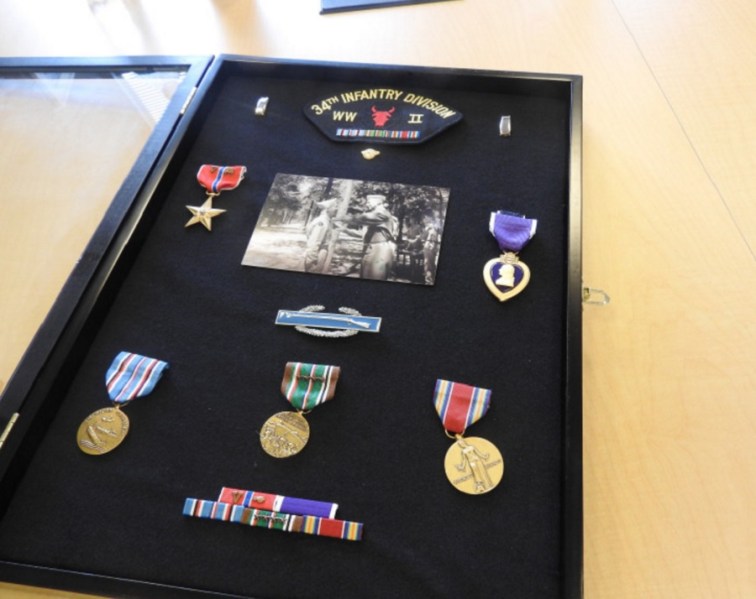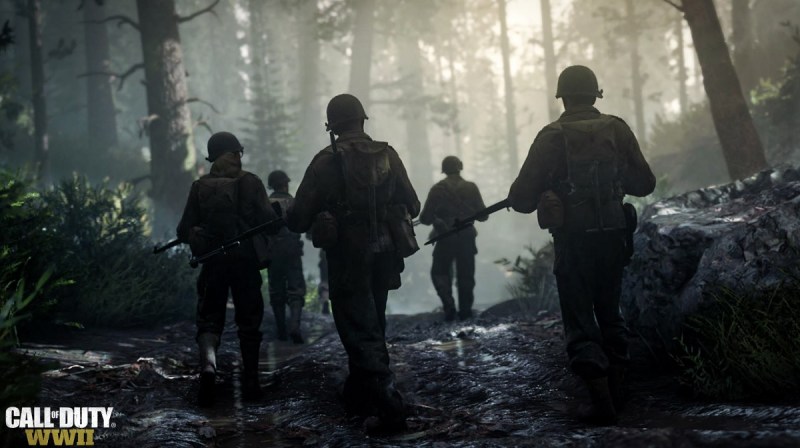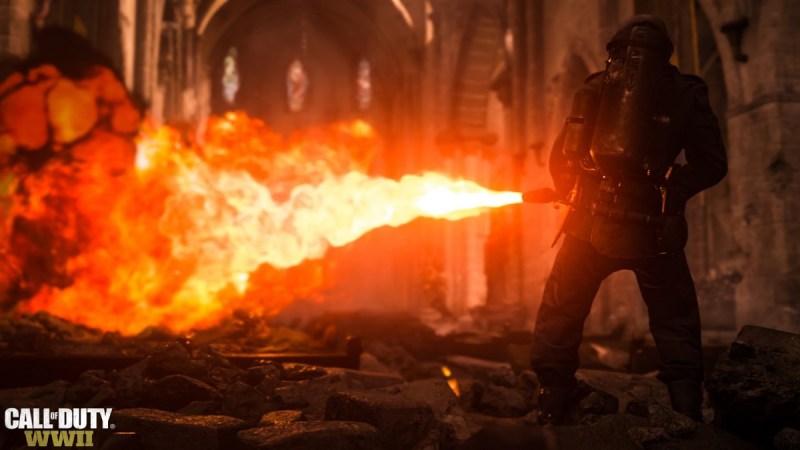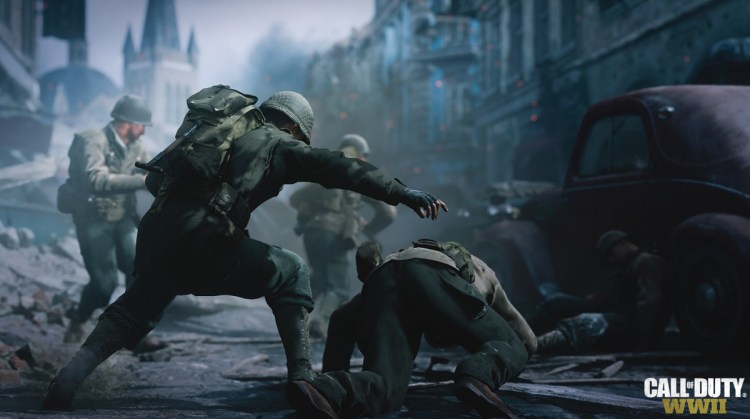GamesBeat: But you do eventually have to ship the game.
Schofield: We have 300 people who are all creative. You guys come up with these ideas. You guys come up with those ideas. You can’t ever come up with enough. These games are so gigantic now.

Above: Glen Schofield’s grandfather was in the 34th Infantry Division and earned a Purple Heart.
GamesBeat: With three-year cadence for Call of Duty, are you getting into a groove now that you have a couple of projects behind you?
Condrey: Your ambitions scale. The industry is so dynamic and so exciting that the extra time gives you more opportunities to think in pre-production about what you want to do. It also gives you more time to react to what fans want. But it never seems to translate to feeling like we’re more efficient or more on time. It’s always going 100 miles an hour. Certainly I can’t imagine going back to the days when we turned a game around in 18 months.
June 5th: The AI Audit in NYC
Join us next week in NYC to engage with top executive leaders, delving into strategies for auditing AI models to ensure fairness, optimal performance, and ethical compliance across diverse organizations. Secure your attendance for this exclusive invite-only event.
Schofield: We couldn’t make this in any less time. But the second year is a slog, for me. The first year is exciting. We’re getting the new ideas in pre-production. The second year, you’re about a year away from when it really starts coming together. That’s a long, long time. I’m glad that’s behind us. But we accomplished so much. Now, seeing the game—we do get efficient near the end. Right now, the next six months—
Condrey: We’ll move mountains.
Schofield: This is when everyone knows their levels. They know what they’re doing. They’re putting the little tiny details in. We call them the happy surprises, the happy accidents they leave in there. “That’s a great detail!”
Condrey: It’s also great when you get to the point where you can finally share it with fans. It’s the thing I miss the most about the three-year cycle, the moment when fans get to celebrate with you. It’s great to have the reveal right around the corner.
Schofield: Three years is a long time, but we couldn’t do it any other way now. You’d have to have a team so big that it’s unwieldy.
GamesBeat: Do the fans guide you in some way? Science fiction maybe wasn’t as broadly cheered by the fans. Battlefield’s return to WWI seemed like a popular idea. Did that make the decision to focus on WWII feel better?
Schofield: I know for the two of us, once we make a decision, we usually don’t look back. In this case, we just moved forward. It felt absolutely right. There’s never been a regret about not making AW2 or anything like that. We felt like this was the right one to make. Creatively it was a nice challenge for us. We didn’t want to do rinse and repeat again.
Condrey: We made this shift long before we knew anything about Dunkirk or any other interactive entertainment or linear entertainment was talking about WWII. We look at it now and it feels like the next 24 months is going to be a sort of resurgence for WWII in different entertainment spaces. We’re excited to be there.
Schofield: Not that we got lucky, but—on the last game, the exo-suit, that was in Elysium. That was in Edge of Tomorrow. It was in the cultural consciousness. All of a sudden, after that, we were kind of burnt out on it and we wanted to go back to this. It feels like maybe the same thing was happening elsewhere.

Above: You are part of a squad in the 1st Infantry Division in Call of Duty: WWII.
GamesBeat: It’s a cycle that leads to creative exhaustion and then you get a reboot or a retelling that makes sense.
Schofield: It happens a lot. Rom-coms all seem to come out at once. You do have these cycles.
Condrey: There’s probably two answers to the question. One, we made this decision long before any other big entertainment property was talking about WWII. But we do listen to fans, obviously. Coming out of MW3, fans were demanding innovation. Advanced Warfare was the result of that. Coming out of Advanced Warfare, we saw the opportunity to have a return to the roots that fans were excited about. So both of those were true. We made the decision a long time ago, and it’s exciting to be back now that WWII is back in the zeitgeist.
Schofield: There’s a validation to it. That’s awesome to feel.
Condrey: And the fans definitely help us, too.
Schofield: They seemed pretty excited just when the words “boots on the ground” came out.
GamesBeat: Diversity has a different value these days in games.
Schofield: Completely.
GamesBeat: Battlefield 1 woman as a lead character in a pretty big role. You didn’t expect that in a historical setting. But you have a more diverse scope than past Call of Duty games have had. What’s some of the thinking there?
Condrey: You and I have talked about this before. Our games are better when we have a diverse work force. They’re better when we have a diverse fan base. We want to give people heroes that they can look up to and be inspired by. It’s an important part of Sledgehammer’s value set. We spent a lot of time researching throughout the war, about all kinds of heroes. Men and women—women played many, many roles, from resistance fighters to the Wasps to people in the workforce at home. People of all races. We want to celebrate all the heroes in the allied cause.
Schofield: It’s funny. People have a view of this as, “Wow, it was just all fighting men, right?” I think a lot of that comes from old movies, Big Red One and all that. As we study, we’re thinking, “This war would not have been won without women in the French resistance, women in Poland, women in factories in the United States turning out thousands of Sherman tanks.” It was remarkable for us, though, to see just how many women were actually on the front lines, fighting for different countries.
Condrey: You’ll see that all across the game. In every mode of the game, you can play as heroic women. We have gender and racial diversity throughout.
Schofield: Now, we don’t sugarcoat that part all the time, either. We talk about the African-American platoon. We talk about some of the struggles they go through. That’s not the sole point of the story, but—one of our key characters is Jewish. He didn’t just skate through the world. They gave him some shit. We touch on that as well. It’s not for controversy’s sake. It’s just that that’s the way the world was. Sugarcoating it, going the other way, would be wrong.

Above: Flamethrower in Call of Duty: WWII
GamesBeat: What sort of story did you feel would be your best option for your lead character? I assume it’s a single character you’re following?
Schofield: It’s a platoon.
Condrey: A squad of the 1st Infantry. A squad is usually about 12 men. It rests on Daniels and his best friend and the journey as their squad as they fight across the European theater of war.
Schofield: Each of the five characters that we really push on are—they come back. Let’s use Private Ryan as an example. You have the Italian dude with the mustache. You have Barry Pepper. They’re all characters. That’s what we loved about that movie, right? Those great characters fighting for one another. When one of them got killed or hurt, that was the emotional part. What we try to do here is to give you that connection, the same connection to the characters as you would in a movie, and make sure that each one felt like they had their own voice.
Condrey: I remember we were going through a pre-production exercise, talking about the personal journey that these soldiers would go through in the war. For some people, they enlisted in June of 1944, and a little over a year later they were out of the war. When you see their faces they look like they’ve aged 10 years. The experience put these young men in some harrowing experiences. They grew up quick. Our story tells that, tells the personal story of the squad, the complexities and camaraderie as the squad goes from the English Channel to the liberation of western Europe. But along the way you experience it through a couple of other points of view. We’ll leave that for players to see for themselves.
GamesBeat: There are some hints that you can play a lot of different types of sides in the war. Do you allow people to play on the German side? Is that something you have to grapple with in some way?
Condrey: Specifically in multiplayer—
Schofield: It’s a tough one.
Condrey: Call of Duty multiplayer has always rested on having two factions, two known factions, in this case the Allies and the Axis. The Axis were primarily Germans in Europe. You’ll play as an Axis character in multiplayer. Again, we’re not shying away from that, but we’re also not celebrating that. We don’t want to encourage any like-minded behaviors that would be toxic to our community.
Schofield: We also make a distinction between the SS and the German regular army. We have a moment in the game, an important moment, where a German soldier helps you. Later on you’re trying to rescue a German family, a mother and her daughters. You don’t want to see them hurt. There’s a humanity that we read about a lot that we wanted to get in there. We didn’t want to portray people purely as monsters.
GamesBeat: If you’re doing something more immersive, if you have this intention of respect, does that help you be more honest about that, going into these areas that have some taboo about them?
Schofield: It’s a north star for us. We’re going to be respectful. We’re going to tell the story. It’s a direction for us to follow. It’s the same with any of our games. We always have that north star that tells us where we’re going.
Condrey: It’s a delicate balance that the team embraced. Out of respect, you can’t shy away from some of these issues. Out of respect, you can’t focus on them in a way that feels wrong either. We do touch on some powerful topics, the realities of what happened in the ‘40s in North America, and the atrocities that happened in WWII. But always through that lens of respect and getting it right.

